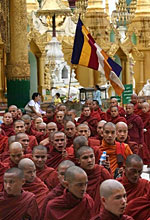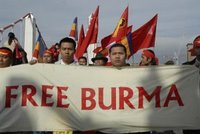“THE SANGHA MUST DO WHAT THEY CAN FOR THE PEOPLE OF BURMA”
– Interview with Saffron Revolution leading monk U Pyinyarzawta
February 15, 2008
 A leading monk of the All Burma Monks Alliance (ABMA), U Pyinyarzawta, recently reached the Thai-Burma border. He has been on the run and hunted by the regime since the Saffron Revolution in September of last year.
A leading monk of the All Burma Monks Alliance (ABMA), U Pyinyarzawta, recently reached the Thai-Burma border. He has been on the run and hunted by the regime since the Saffron Revolution in September of last year.
The Sayadaw (abbot), who led protesters in their recitation of the Metta Sutra, says that he firmly believes he acted as he did for truth and the sake of the people, and not for politics.
He is also a colleague of 88-generation student leaders and was previously arrested, interrogated and imprisoned multiple times. He was also the Taikoat Sayadaw (Deputy Sayadaw) of the now sealed Maggin Monastery in Thingangyun Township, Rangoon.
Two of the six founding Sayadaws of ABMA are now behind bars.
He solemnly says that dialogue is essential for the prosperity of the country.

– Q: Your rev. When did you reach the border?
A: Only a few days ago.
– Q: We know you as one of the leading monks of the Saffron Revolution, like Ashin Gambira.
A: U Gambira is one of the members of ABMA. According to the priesthood, I am the senior-most and most responsible monk among them. There are six monks in ABMA. I contributed suggestions, experience and knowledge. I was first arrested in 1990 and imprisoned for three years. Then I was imprisoned a second time in 1998, for seven years. I am a colleague of Ko Htay Kywe and Ko Ko Gyi.
– Q: Please tell me your age and experience in the priesthood?
A: I’m 48, and have spent 28 years in the priesthood. I’m the Taikoat of Maggin Monastery.
– Q: Is Maggin Monastery sealed now?
A: Yes, The Chairman of ABMA is now in detention at Insein prison. He is the senior-most Sayadaw of this Monastery and I’m the Taikoat (Deputy).
– Q: Please share your memoirs and experiences of the Saffron Revolution.
A: The most significant experience was on the day we started our Ex-Communicative boycott. We announced that we would start our boycott on the 18th of September. If we failed to do so, the people would see we could not keep our promise and it would let everyone down, the entire Sangha (religious community) and Sasana (religion). We planned to conduct these boycott rites at five different places in Burma, three in Rangoon alone. We succeeded in all three places in Rangoon. In Mandalay, they successfully initiated the boycott on the 19th, instead of the 18th as planned. First we were skeptical about the chances of successfully launching the boycott. But we exceeded all our expectations. So, this was the most thrilling experience for me.
– Q: How about your experience of marching in procession with your fellow monks and chanting the Metta Sutra?
A: I did not march with experienced monks at the forefront, but took a leading role by rallying around them and managing the work that had to be done. If I marched with them at the forefront the movement would have been instantly exposed and dealt with. So I didn’t march at the front. The leading monks in these processions were leading monks of member monk organizations in our alliance.
– Q: How did you flee from arrest after the movement?
A: I’ll tell you what I can, but I must protect the safety of people who are still in Burma. The regime raided our Maggin Monastery on the 26th of September. Starting several days before the Saffron Revolution, following the arrests in August of my colleagues Min Ko Naing and Ko Ko Gyi, I hadn’t stayed at my Monastery. Then we formed the monk alliance. I was outside the Monastery when they raided. Since the crackdown I have been on the run at many hideouts with the assistance of friends, monk colleagues, devotees and my students. During this time we have worked together to reorganize our monk alliance. I’d like to say we have made all necessary preparations.
– Q: When did you realize the movement must be led by the monks?
A: We have had many monk organizations for a long time prior the August fuel price hike demonstrations and September revolution – including the Young Monks Association, Sangha Union, Rangoon Young Monks Union and Thawtuzana. We already had the idea of joining with the people and pro-democracy forces when the time was ripe. When the junta suddenly and drastically raised the price of fuel, the people resented the action and took to the streets. Then the junta cracked down on their movement with their thugs, USDA and Swan Arr Shin, and their movement was disrupted. So we prepared to continue their unfinished task by forming a monk alliance in Mandalay. But our movement broke out in Pakokku, so we then let the media know of our intention to initiate a boycott against the regime. In Pakokku too, the leading monks of the movement are from our monk organizations.
– Q: What is the ultimate goal of your monk organization?
A: We’ll do anything which will be good for the people and the country. But our movement must be in accordance with our religion and for the good of the people, because our organization is not a political organization. We will act only for the national cause.
– Q: What made you decide to flee to the border and leave Burma?
A: I didn’t want to give trouble to anyone who harbored me while I was on the run and being hunted. I feared they also might give trouble to my family, relatives, devotees and students. So I decided to flee to the border to avoid such miserable things.
– Q: Can another movement like the Saffron Revolution emerge again?
A: We must wait for some time. When the time is ripe, it will happen again. When the people’s resentment against the regime reaches a certain level and they decide to express their discontent, we will be prepared to join. Such a situation will create the atmosphere for another Saffron Revolution or something similar. I see now that preparations are being made by monks, students and pro-democracy forces for just such a time.
– Q: Now I’d like to go back to the current situation. The junta has announced that they will go ahead with their roadmap. How should the people respond to their plan?
A: The people in Burma can do two things. The first one is to protest, but it has many limitations. The junta would arrest them, imprison them, kill them and shoot them. The other thing the people can do to express their will and desire is to implement a boycott of the referendum. These actions are simply exercising their rights. They can protest against the referendum or they can denounce the referendum. I hope all pro-democracy forces will do what they can. This is a crucial time for all of us. We must have a concerted effort to achieve our goals.
– Q: What is your opinion on the ruling government?
A: They are making simple things complicated. They didn’t keep their promises to transfer power to the winning party after the 1990 general election. The current crisis can be resolved by entering into dialogue. But they are only concerned with their own interests and look to cling to power by holding this referendum and a new election in 2010.
– Q: Some say that monks should stay away from politics. What is your opinion?
A: Politics is a vast and broad field. We are not involved in politics, this is just an accusation made against us by the regime. We will not form a political party and we will not contest parliamentary elections. We don’t even have the right to vote. We are monks, not politicians. But even in the reign of King Narathihapate, Shin Dethaparmaukha acted as a diplomat for the sake of the country and the people. The monks are acting for the sake of the people and the country in a perspective of religion similar to that of Shin Dethaparmaukha. We are not conducting politics.
– Q: How do you see the role of the Sangha Mahanayaka (the highest government sponsored monk organization)?
A: This is the highest organ of monks and Sasana in Burma. This organization once issued an appeal to the junta and the people at the height of the 1988 uprising. Again, this is not politics, it is religion. They appealed to the government to stop the killing and torture. They appealed to the people to keep discipline. Similarly they should again appeal to the government in consideration of the people and the country. In this way they will gain dignity and respect for themselves and the Sasana. So I wish the Sangha Mahanayaka will appeal to the government and stand boldly for truth and justice.
– Q: Can they take such a position?
A: If they want to, they can. If they want to avoid such a situation, they can. No one can blame them for it. If they can do it, it will be very much to the benefit of the people and country. I think they should do it. It is right and not contrary to the Buddhist disciplinary code.
U PYINYARZAWTA
 Born in Maezali, Natmauk Township on the 6th of November 1960.
Born in Maezali, Natmauk Township on the 6th of November 1960.
Age: 48, Priesthood: 28.
Alias: U Eindaka.
Ordained at age 20, studied Buddhist literature and scripture in Rangoon, Mandalay, Pakokku, Yenanchaung and Taungdwingyi.
Served as Chairman of the Ahlone Township Young Monk Union.
After the junta staged a coup in 1988 he served as Lower Burma Organizational In-charge of the Young Monk Union, when it was reorganized.
He was arrested and imprisoned for three years when monks staged their first Ex-Communicative boycott in Mandalay, which he supported and joined through the Lower Burma Young Monks Union. He was released in 1993, rearrested in 1996 and released after interrogation.
He was arrested again in January 1998 and sentenced to 7 years imprisonment, being held at Insein and Thayawady prisons. He was released from Thayawady prison in 2004. Then he stayed at Maggin Monastery where he served as a teaching monk and Taikoat Sayadaw. He took part in reorganizing the Young Monk Union and founding the All Burma Monk Alliance.
By Nay Thwin
Source : www.Mizzima.com




